Driving Change through Country Partners
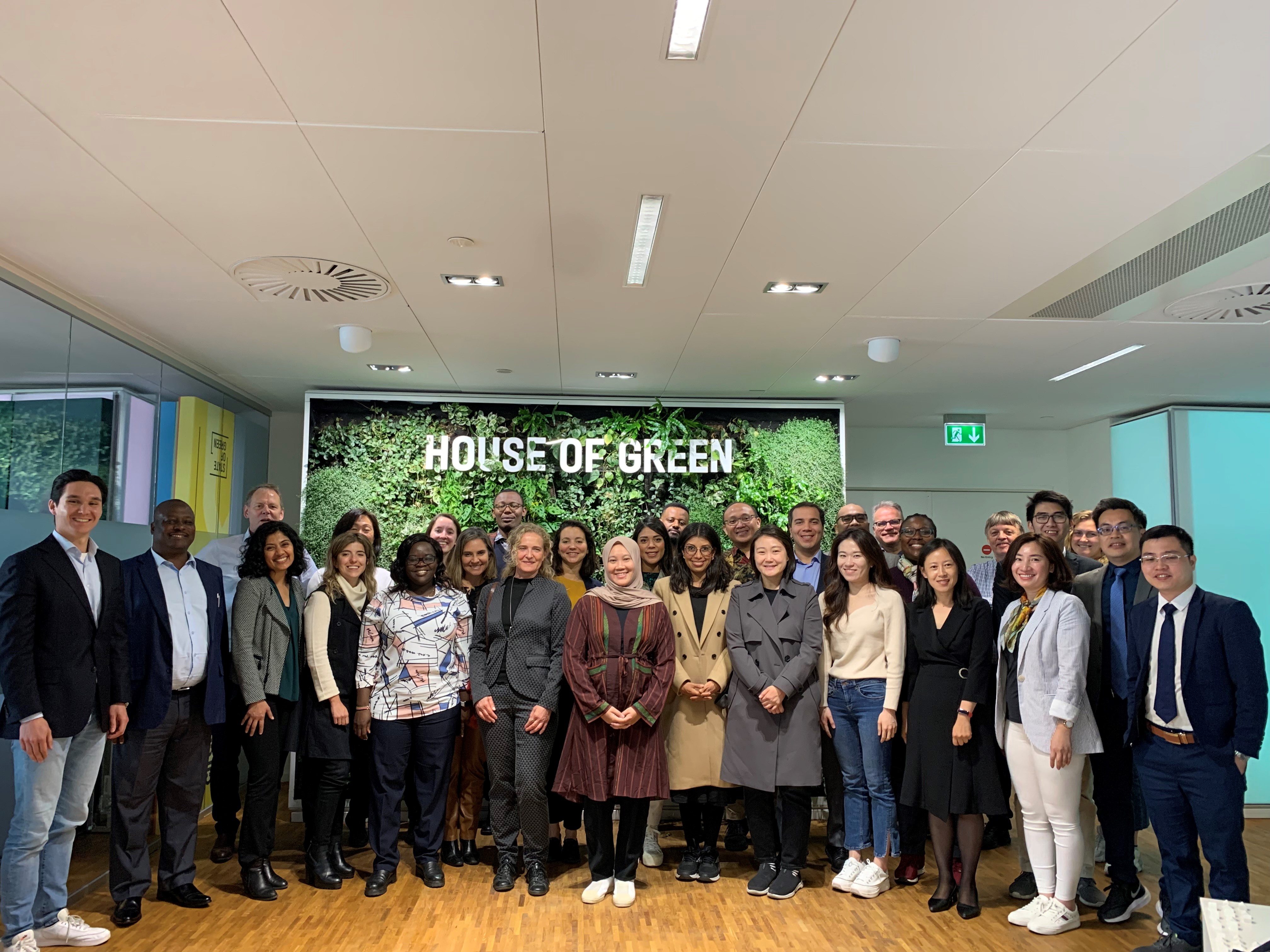
External article
Read MoreCountry
Republic of Colombia, Denmark, Vietnam, Indonesia, South Africa, Kenya, The Republic of Korea, Netherlands, United Mexican States (Mexico)
Publication Date
2022-06-23
Leading into the Next Phase of P4G
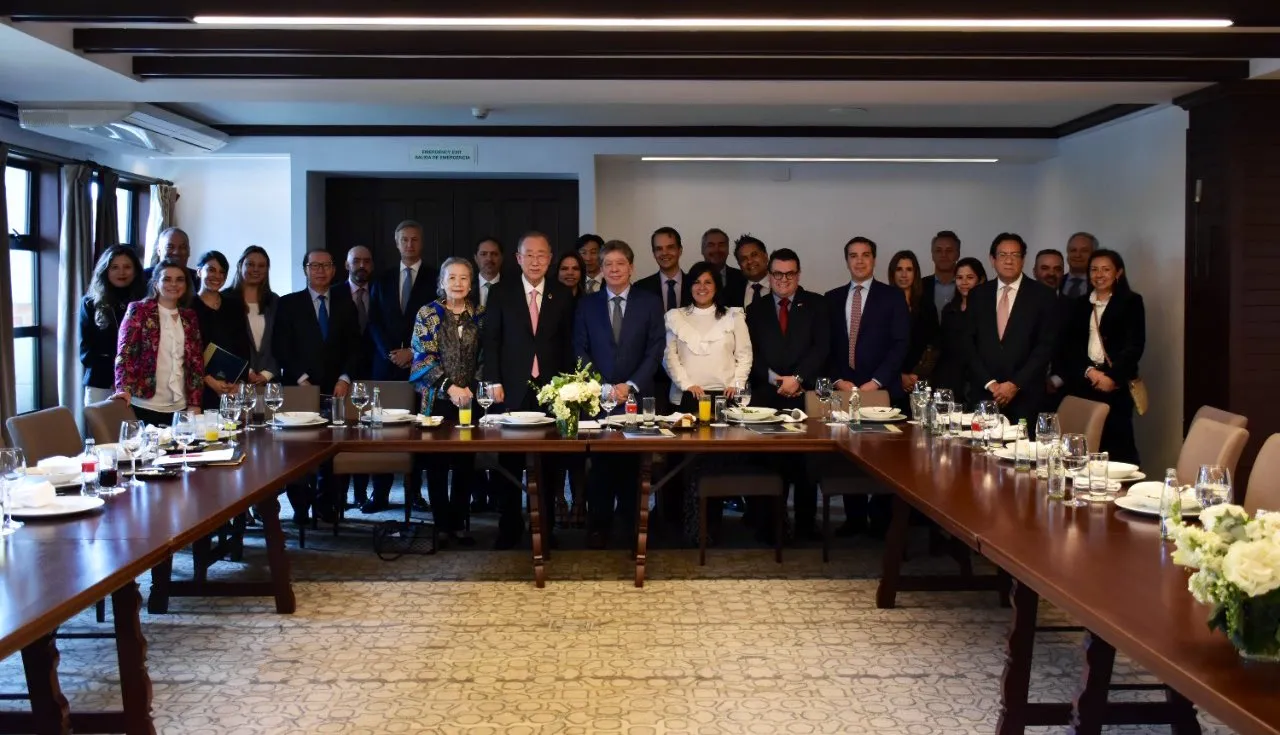
External article
Read MoreCountry
Bangladesh, Republic of Colombia, Denmark, Indonesia, Kenya, Netherlands
Publication Date
2022-05-17
What's New from P4G in 2022

External article
Read MoreCountry
Bangladesh, Republic of Colombia, Denmark, Ethiopia, Vietnam, Indonesia, South Africa, Kenya, The Republic of Korea, Netherlands, United Mexican States (Mexico)
Publication Date
2022-04-19
Clean Transport project unites Colombian businesses to improve air quality
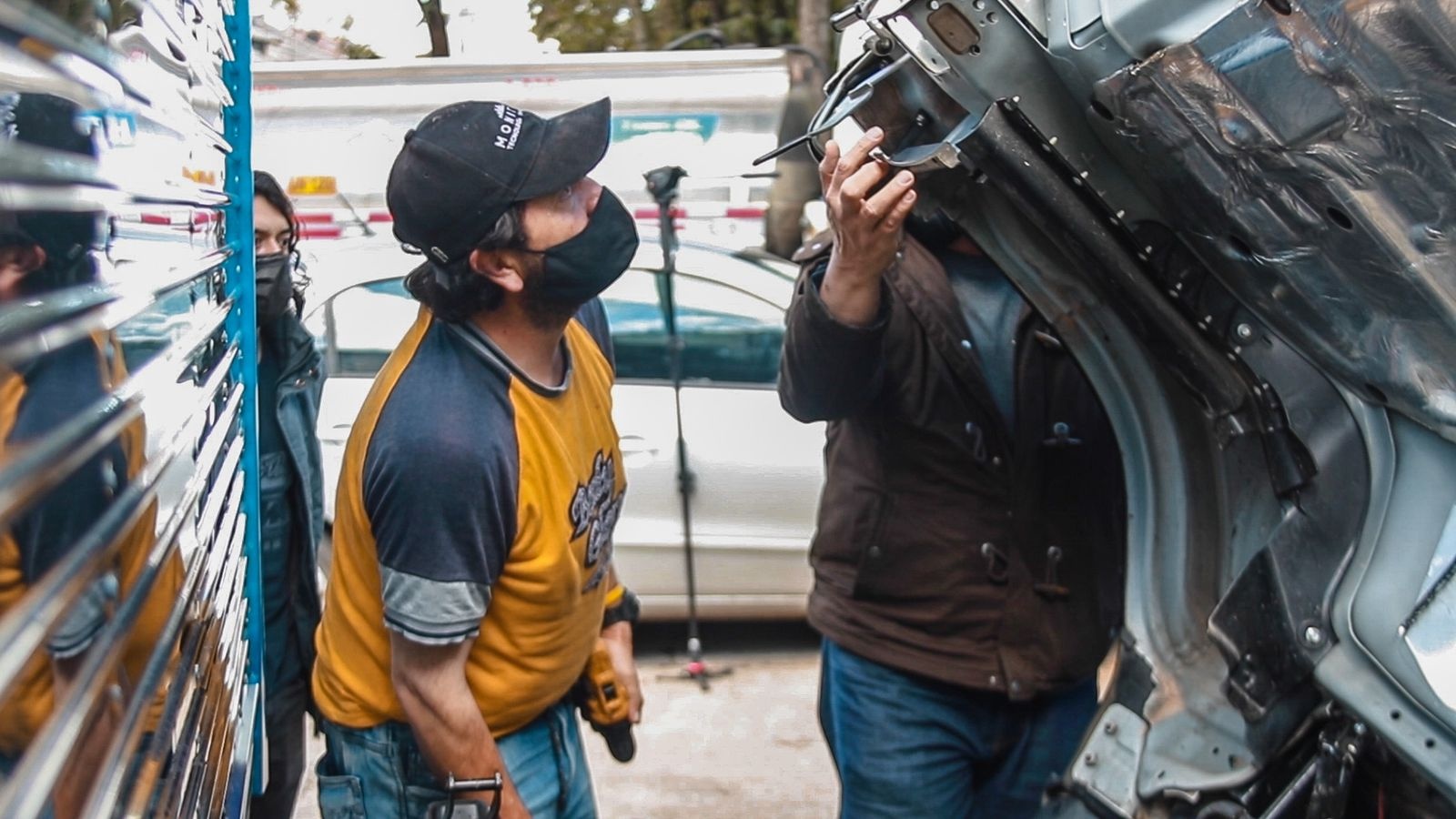
Subject
Events
Country
Publication Date
2022-04-18
Partnership
About
As Colombia seeks to improve its air quality, sustainable transportation will play a key role in providing a cleaner environment, better jobs, and improved quality of life. Fortunately, companies are on board with this shift, as P4G’s recently closed out Clean Freight Transport partnership demonstrated. On April 7, the partnership presented its results from implementing monitoring devices in freight trucks to measure greenhouse gas (GHG) emissions and improve air quality in Bogotá.
Manuela Uribe, Director of Smart and Sustainable Cities at ProBogotá Region, opened the event by sharing the motivation and context behind the project. In addition to Colombia’s overall goal of reducing emissions 51% by 2030 and carbon neutrality by 2050, Bogotá has made its own commitments to support Colombia’s efforts. This includes the Clean Air Pact for companies and Bogotá’s emissions reduction target of 57% by 2030.
For the Clean Freight Transport team, greening truck logistics could help support these goals and address increasingly severe air quality alerts. The team brought together partners to pilot an innovative approach to reducing emissions with universities designing GHG monitoring devices and analyzing data; Colombian companies such as Terpel, Corona, Postobon, Noel, La Recetta, Disan, Vanti, Dragon, Opperar implementing them; and organizations like ProBogotá and ANDI sharing the results. “This is how you design smart cities where everyone contributes with their area of expertise,” Uribe noted.
Dan Mejia, P4G’s Latin America Regional Manager, highlighted the partnership’s value in proving a viable market for companies to pursue green logistics, gathering transparent data to design strategies for clean technologies, and working with the public sector to drive policy reform that will facilitate further investment and sustained results.
Despite challenges from COVID-19 delaying the project, 11 companies committed to install the devices in 27 vehicles, which transmitted real time data through a SIM card and stored it on the cloud. The partnership conducted simulations to understand the motor and emissions for different trucks to establish baseline data. Using the data and analysis, the project aims to make transport businesses more efficient.
Leonardo Rodriguez, Research and Transfer Manager at Universidad EAN shared the benefits for different stakeholders. For companies, the pilot project enabled them to design strategies to measure and understand emissions to meet reduction goals. They can do so through optimizing routes, times, weight and better driving. The public sector can use the emissions data to shape policies, including incentives, fees and regulations, to meet climate goals. They can also make data-based decisions based on specific route or city emissions. Going forward, Clean Freight Transport plans to continue monitoring trucks’ conditions, develop an interactive logistics map, and a dynamic emissions map to better understand how to improve green transport.
Bruce MacMaster, President of ANDI, shared his reflections on the pilot’s importance to highlight Colombia as a hub for innovative climate investment. By promoting the competitiveness of companies to comply with climate goals, this model offers a path to optimize truck logistics, improve e-mobility technology, and reduce emissions, all necessary components for meeting Colombia’s goals for an electric fleet.
The event also featured a discussion between various partners, including representatives from the Ministry of Environment, participating companies and universities. They shared how the pilot enabled them to rapidly calculate emissions with new technology and improve instruments through more accurate sources of information. The discussion also highlighted how flexibility in regulation and less risk can enable greater scaling, since the pilot model proved the efficacy and value before expanding. The next step will now be getting more companies to implement sustainable strategies. Partners noted the value of collective action that promotes solutions not just for e-mobility but for all people in an interconnected city.
In the words of Ana Marina Jiménez, Vice President of Corporate Affairs at Tigo, “For a truly smart city, the people must be at the center and solutions must be about benefiting the communities.”
Watch the full session here (in Spanish).
How P4G measures impact
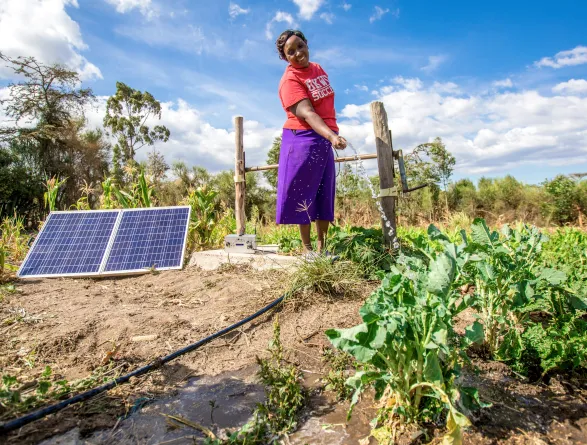
External article
Read MoreCountry
Bangladesh, Republic of Colombia, Denmark, Ethiopia, Kenya, Netherlands, United Mexican States (Mexico)
Publication Date
2022-03-23
Blended Finance Shows Way Forward for Scaling Climate Solutions
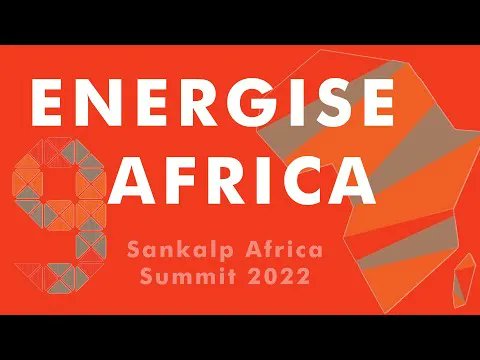
Subject
Events
Country
Publication Date
2022-03-10
Partnership
About
Rapidly scaling climate solutions in emerging economies is a pathway to a better future for people and the planet. Blended finance can progress that goal because of the role it plays in mitigating the risk of these solutions. This and other innovative approaches to funding were part of the Blended Finance Roundtable hosted by Energise Africa and Ethex at the Sankalp Africa Summit. P4G’s Director of Investments Sarbinder Singh spoke at the event.
Claire Njoki, Associate at Convergence, kicked off the panel with a presentation about the recent increase in blended finance for climate, especially as funding is increasingly addressing adaptation, in addition to the traditional focus on mitigation. As organizations design processes to streamline financing, Njoki cautioned against reinventing the wheel. Rather than trying to establish complex structures that will be difficult for investors to understand, we should be thinking about how to replicate and scale existing models while customizing implementation to each region’s unique conditions. That’s why funding is needed early on to support the design and structure of transactions to mitigate risk – what Convergence calls “design funding.”
With estimates that we’ll need $40 billion per year to ensure universal energy access by 2030, it’s clear that public sector money alone will not lead the world to achieve Sustainable Development Goal 7: Affordable and Clean Energy for All – the private sector must play a role. Jon Lane, Associate Director at the Carbon Trust, shared Transforming Energy Access (TEA)’s approach to leveraging private financing to increase inclusive access to energy. This involves co-financing at the project level where they have 50% of cost share to ensure private sector buy-in (although TEA offers 75% of the financing if it’s an African-owned business). TEA also emphasizes being a patient equity investor, where they can support pioneering companies to get the sector moving and then crowd in private investment. Lane also noted how Energise Africa offers a prime example of how market-enabling platforms can deliver on the promise of blended finance by really catalyzing investment that attracts the private sector.
Sarbinder Singh, P4G’s Director of Investments, shared P4G’s approach to providing catalytic grant funding and acceleration support to our partnerships, helping them refine and strengthen their business models to be ready for institutional investment. P4G helps mitigate some of that up front risk with up to $1 million in grants, with the hope that mature partnerships can attract a few million more from DFIs or patient capital. That’s where the blending comes in – partnerships have demonstrated the efficacy of their approach, but they need an extra leap to transition to financial close and P4G helps them across. By working with projects in different stages, we start to see a “finance continuum” emerge where organizations develop to achieve more financial sustainability and greater impact.
Sharing the perspective of Energise Africa, Product Innovation Manager Shahid Mian shared Energise Africa’s approach to raising money from risk-tolerant personal investors in the UK to fund solar PayGo companies in Africa. Recipient companies tend to be younger, less mature businesses with low collateral, so they find it difficult to raise money in the local commercial ecosystem. Energise Africa has found how a crowdlending channel can contribute significantly to bridging the SDG funding gap, while providing investors with a transparent understanding of their returns. Going forward, blended finance will be key to scaling and diversifying through offering investment options in other currencies, such as USD, and expanding into new sectors and geographies.
The event also included breakout discussions to explore strategies for organizations working on funding climate solutions in developing countries. With a focus on innovative blended finance approaches to de-risk emerging market investments, Singh, Ashford and Lane led a frank discussion about the need for public and philanthropic funding to have a higher appetite for risk and come in where others cannot. As Jon Lane noted, “we celebrate success and condemn failure, but if we’re supposed to take higher risks, failure is a part of that.” Participants also noted the need to focus more on supporting diverse entrepreneurs and incorporating flexibility in funding.
Other breakouts focused on developing patient and affordable currency, where a fair price needs to reflect risk and more initiatives need to enable borrowers to deal in local currencies.
As Claire Njoki noted, “we need to be more nimble, flexible, and daring enough to provide solutions.”
Introducing P4G's New Food and Agriculture Partnerships
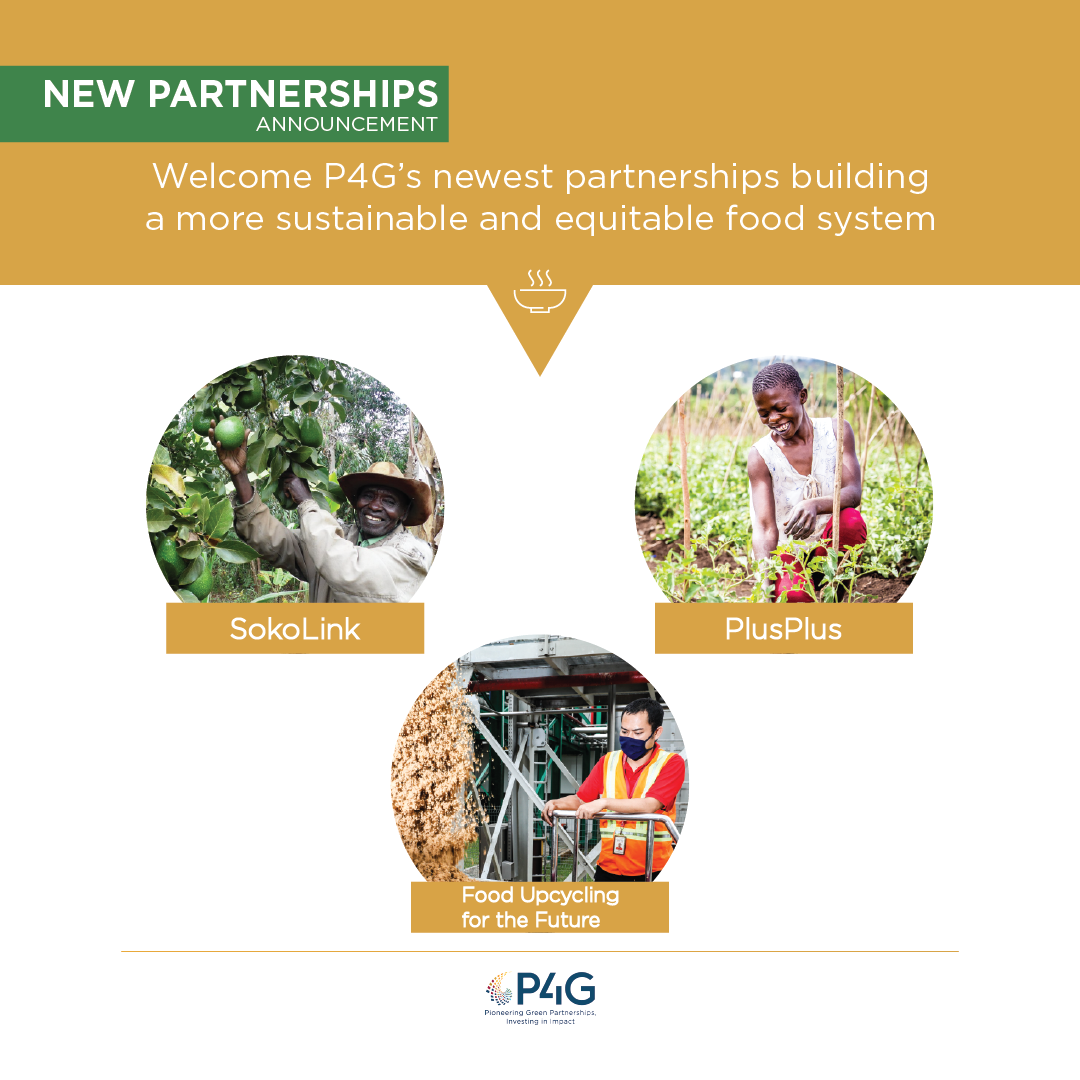
Subject
P4G Partnerships
External article
Read MorePublication Date
2022-01-25
Partnership
PlusPlus, SokoLink, RE:harvest – ASEM SMEs Eco-Innovation Center ,
P4G's Reflections on COP26 and 2021 State-of-the-Art Winners
.png)
External article
Read MoreCountry
Bangladesh, Republic of Colombia, Denmark, Ethiopia, Indonesia, Kenya, The Republic of Korea, Netherlands
Publication Date
2021-11-17
Partnership
Africa GreenCo, Circular Fashion Partnership, Energise Africa, FLAWLESS, GeoFutures GreenInvest, Sustainable Special Economic Zones, Sustainable Food Partnership, BetterCycle, CFI2030 Jeju, Sociedad Hipotecaria Federal (SHF) Sustainable Portfolio, Closing the Loop on Textile Waste in Kenya, Netherlands Water Partnership (NWP) & Kenya Innovative Finance Facility for Water (KIFFWA) ,
Mobilizing Finance to Reach Net Zero in Developing Countries
.png)
Subject
P4G at COP
Publication Date
2021-11-12
Partnership
About
Scaling tangible solutions on-the-ground in developing countries is a pathway to tapping into the billions and trillions needed to finance a net zero future. "The scale of ambition needs to be met by very practical approaches by the public sector and also the private sector," said Emmanuel Nyirinkindi, Vice President of the International Finance Corporation (IFC) as he delivered the keynote speech at P4G’s COP26 event held on November 9 at the We Mean Business Coalition Pavilion.
Nyirinkindi shared IFC’s priorities of decarbonizing five sectors – energy, cities, agriculture, transport and manufacturing. He spoke about its target of spending 35% of financing on climate over the next five years and the importance of creating bankable projects and investing in early technologies that can help decarbonization.
Ana Hadjuka, Founder & CEO of P4G Partnership Africa GreenCo, picked up Nyirinkindi’s call for the right projects and shared how GreenCo provides exactly that – an actionable operationalized new business model that is mitigating investment risk in Zambia and Southern Africa. As a creditworthy buyer and trader of electricity in Southern Africa, GreenCo is the kind of business model that is reimagining the energy sector landscape in Southern Africa.
Allan Chivunda, Energy Officer at the Ministry of Energy in Zambia built on Hadjuka’s remarks by sharing some of the challenges Zambia’s energy sector was facing. The level of investment in renewable energy has been low in the country because of the high costs of capital and the high risk of the national utility companies. Through its model, GreenCo can de-risk utilities and directly contribute to Zambia’s aspiration of opening its power market and moving away from a single buyer model.
Driving home the need for on-the-ground innovative solutions, Lisa Ashford, CEO of Ethex and P4G Partnership Energise Africa, shared the untapped opportunity presented by crowdfunding. Energise Africa is a platform that is financing solar businesses in sub-Saharan with investments from individual investors who are using “the power in the pocket.” She spoke about the scalability of the business model across different sectors such as through P4G partnership PlusPlus, another impact investing platform but for agribusinesses. Ashford also made the key point that the benefits of these platforms go beyond energy and percolate to health, water access and financial inclusion.
Highlighting the private sector perspective was Nicholas Nesbitt, Chairman of Kenya’s Capital Markets Authority. He spoke about the importance of raising awareness within the private sector about what it takes to create a green business. He also underscored the need for strong framework to ensure that businesses’ claims of complying with sustainable standards are verifiable and accurate. Nesbitt shared homegrown solutions arising out of Kenya such as a successful green bond for funding student housing and agribusinesses. He also tipped his hat to P4G’s work in areas such as micro-e-mobility in Kenya where there’s now a buzz of people trying to get businesses going. As Nesbitt said, P4G is helping open doors to “open some eyes and open some wallets.”
Shinta Kamdani, CEO Sintesa Group added another private sector voice to the discussion and zeroed in on the opportunity available in Indonesia. She spoke of the rising trend of sustainable financing and green investments and how the government has identified a potential $250 billion in value creation by investing in areas like biomass energy generation, electric vehicles and batteries. She noted that the energy transition is a priority and challenge area for Indonesia, which is why government and financial institutions must collaborate closely to achieve Indonesia’s ambitious renewable energy goals.
Capital flow to developing countries is essential but it’s also important to distinguish between countries so more money can be mobilized to those with the most need, said Torben Huss, CEO of the International Fund for Developing Countries. From de-risking investments to institutions providing guarantees, Huss shared several ways for assisting countries to develop their infrastructure.
Marco Serena, Head of Sustainable Development Impact at the Private Infrastructure Development Group (PIDG) echoed Huss’ suggestion of guarantees for strengthening infrastructure in developing countries. He shared how PIDG is in the process of offering a guarantee to issue its first green bond in Vietnam and how it made its first investment in electric vehicles last year. Serena mentioned that PIDG has a lot of the tools to move the needle in emerging markets, but it would need to work with partners like P4G to strengthen and scale these solutions.
Rebecca Fisher, Associate Director at the ClimateWorks Foundation spoke specifically about the challenges in the electrification of transport. She highlighted how more money is flowing into renewable energy and energy efficiency and why that must expand to transport. As she pointed out, electrification of transport is a viable business model. “It’s not just a technology for the wealthy countries of the world, it’s for everyone.”
Katherine Stodulka, Director of the Blended Finance Taskforce at SYSTEMIQ urged everyone to pay attention to not just the financial commitment but also where the finance is going. She shared the need for a financial system transformation, as well as an economic one. Much like Nyirinkindi at the beginning of the session, Stodulka brought it back to the basics and how first projects at the millions must accelerate to get to the billion- and trillion-dollar agenda.
In her powerful closing, Stodulka aptly said, “This is a people agenda,” and “we don’t get the planet stuff right without the people.”
P4G Global Director Ian de Cruz moderated the event. Watch the entire session here.
Net Zero Partnerships are Catalyzing Investment in Developing Countries
_0.jpg)
Country
Bangladesh, Republic of Colombia, Denmark, Ethiopia, Indonesia, Kenya, The Republic of Korea, Netherlands
Publication Date
2021-11-11
Partnership
Agroforestry for People, Peace and Prosperity, Circular Fashion Partnership, Energise Africa, GeoFutures GreenInvest, Sustainable Special Economic Zones, Sustainable Food Partnership, BetterCycle, CFI2030 Jeju, Sociedad Hipotecaria Federal (SHF) Sustainable Portfolio, Closing the Loop on Textile Waste in Kenya, Netherlands Water Partnership (NWP) & Kenya Innovative Finance Facility for Water (KIFFWA) ,
About
As part of the UN Climate Change Conference (COP26), P4G, Denmark and the Republic of Korea hosted an event emphasizing tangible solutions that are driving change on the ground to turn commitments into solutions. Moderated by P4G Global Director Ian de Cruz, the event featured high-level speakers who underscored P4G’s role in accelerating market-based partnerships in developing countries that contribute to delivering a greener, more inclusive future.
Hyeoun Jenny Kim, Climate Ambassador and Deputy Minister for Climate Change, Republic of Korea, opened the event by sharing how the 2021 P4G Seoul Summit in May served as a stepping stone to this pivotal moment at COP26. Ambassador Kim outlined how the P4G Summit significantly contributed to Korea’s strategy of net zero by 2050 and its nationally determined contribution (NDC) to reduce emissions 40% by 2030. On a global level, the Seoul Declaration enabled the world’s two largest emitters, the US and China, to join hands with other countries to stop financing fossil fuels. Locally, the Summit shifted the perspective of many key stakeholders in Korea, especially businesses which have since announced commitments to reduce emissions. “The P4G Summit made Korea’s ambitious commitments possible,” Ambassador Kim said.
Flemming Moller Mortensen, Minister for Development Cooperation, Denmark, emphasized the need for collaboration to fight climate change. Partnerships at the heart of P4G offer an actionable opportunity to accelerate green investments and innovative solutions centered on developing countries’ priorities. “Act now for our green future together, so we can create jobs, education and hope for young people in developing countries,” Minister Mortensen said.
Building on the message of a better future, Kitty van der Heijden, Director General for International Cooperation, Netherlands noted the need to protect those who have contributed the least but remain the most susceptible to climate change. The Netherlands sees P4G as a delivery mechanism that can rapidly get solutions to scale in the eight years left to keep 1.5 degrees in reach. Van der Heijden emphasized that P4G leverages the power of diverse partnerships, urging more countries to fund and support its efforts for a greener future. “The sky is the limit. Be inspired today and know that we have to set high commitments here to deliver for the people who deserve it,” van der Heijden said.
As future host of the 2023 P4G Summit, Colombia has been inspired by P4G’s stewardship and looks forward to the continued opportunity to deliver results, Vice Minister of the Environment, Nicolas Galarza shared. Despite being a minor emitter globally, Colombia has committed to reduce emissions by 51% and has invested above average for Latin America in green finance and green recovery. As a leading seller of electric vehicles in Latin America, Colombia has also shifted from only 0.2% of the power grid to 14% being powered by renewable energy. Galarza highlighted how Colombia hopes to lead by example but they can only do so through support and partnerships, like those with P4G, underscoring the need to scale this up with new countries, donors and partnerships.
Simon Sharpe, UK Director for Energy, Transport and Nature, UK COP26 Unit shared how the event was a testament to what a strong partnership P4G is. In identifying its priorities, the COP26 team underscored the enormous need to go massively faster – and how partnership and collaboration have a central role to play in that rapid transition. To do so practically, countries need to implement the right policies to reduce costs and level the playing field so the global market prioritizes sustainable products.
The event also had a celebratory section recognizing P4G’s 2021 State-of-the-Art Awards. Minister Mortensen announced the Partnership of the Year, Closing the Loop on Textile Waste in Kenya. The partnership was recognized for its transformative approach to recycling 100,000 kg of fabric waste, creating jobs and significantly reducing greenhouse gas emissions. Kevin Thiong’o, Venture Builder, Enviu and partnership lead shared their appreciation for the award and its validation of the circular model, noting how they can collaborate with P4G’s network to build sector-wide models that tackle textile waste.
Shifting to a panel discussion with representatives from P4G’s partner countries, Dr. Julius Muia, Principal Secretary, Ministry of Finance, Kenya shared how COP26’s themes on mitigation, adaptation and finance bring to life what P4G is about. With Kenya’s ambitious NDC and Vision 2030 goals, P4G partnerships like Energise Africa and Sustainable Special Economic Zones (SSEZ) have helped progress the development agenda in priority sectors like energy and manufacturing. “We see P4G as a very good ecosystem that enables us to tap into international capital and expertise,” Dr. Muia said.
Fekadu Beyene, Commissioner, Environment Forest & Climate Change Commission, Ethiopia shared Ethiopia’s progress in implementing its Climate Resilient Green Economy strategy and updated NDC, where P4G is accelerating 10 partnerships in the country. Beyene noted how P4G has been key in bringing together the private sector and civil society where the government was lacking. Additionally, P4G partnerships support key development priorities in terms of capital and innovative ideas, including policy recommendations and action. “We are learning and moving in the right direction but we also ask you all to strengthen engagement and support for green development,” Beyene urged.
In Bangladesh, P4G's support is accelerating a green transition, said Shahriar Alam, State Minister, Ministry of Foreign Affairs, Bangladesh. He highlighted the Circular Fashion Partnership, which aligns with Bangladesh’s commitment to a circular economy by transforming the fashion system. Through the partnership, manufacturers can benefit with a fair market value for textile waste and increase recycling capacity. This will help Bangladesh deal with stockpiles and economic shocks from COVID-19 to build back better.
Representing the State-of-the-Art sector winner for energy CFI2030 Jeju, Yoon Hyongseok, Director General, Future Strategy Bureau, Jeju Special Self-Governing Province shared Jeju’s path to becoming a carbon-free island by 2030. He noted how they’ve expanded solar and wind power, encouraged smart and green mobility, and created an energy efficient grid. They hope other cities will join in similar efforts and mentioned that P4G can play a key role in scaling these solutions.
Ani Dasgupta, President and CEO, World Resources Institute reinforced how P4G is delivering on commitments by developing solutions in partner countries. With a $1.5 trillion gap to achieve a green economy, the private sector needs to work with the public sector to solve this problem. P4G finds these solutions to build local systems. “Without this, we’re not going to get the outcome we need,” Dasgupta said.
Nikole Burroughs, Deputy Assistant Administrator, US Agency for International Development (USAID) closed the session by sharing USAID’s ambitious new targets to help people and the planet. Burroughs called for a paradigm shift where private sector investors back sustainable development, and multinational corporations and governments move from commitments to action. This provides an opportunity to support innovations with investments to pave the way for a more resilient and just world.
Watch the full session here.
